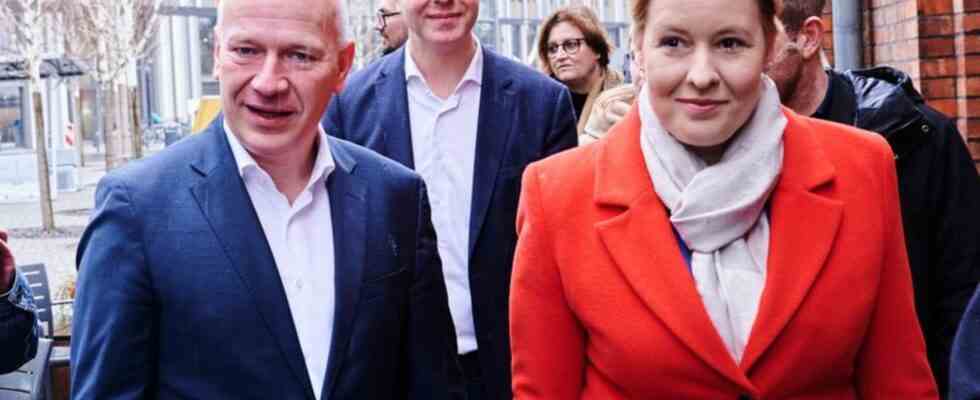House election
The CDU is striving to form a government in Berlin as quickly as possible
CDU state chairman Kai Wegner (l) and governing mayor Franziska Giffey come together for exploratory talks. photo
© Annette Riedl/dpa
Red-green-red could soon be history in Berlin. CDU and SPD agree to start coalition negotiations. CDU election winner Kai Wegner pushes the pace.
After the decision by the CDU and SPD in Berlin for coalition negotiations, CDU state chief Kai Wegner is striving for a speedy agreement. “We have set ourselves a very tight time frame. We said we want to be finished in four weeks,” Wegner said on Thursday evening on the “Welt” television channel. “The coalition agreement should be in place by the end of March.” Then follow the member survey of the SPD. From Wegner’s point of view, it is realistic that the Senate could start in late April or early May.
According to Wegner, the working groups are to be set up on Monday in the course of the coalition negotiations. In the days that followed, the umbrella group would meet with the top representatives of the parties for the first time and discuss the further procedure.
If the coalition talks are successfully concluded, 50-year-old Wegner is likely to become the new governing mayor and replace Franziska Giffey, who has only been in office since December 2021. The SPD state chairwoman has declared her willingness to become a senator in the new state government. The CDU last appointed a head of government in Berlin with Eberhard Diepgen, who served from 1984 to 1989 and from 1991 to 2001.
The CDU won the vote in mid-February with 28.2 percent. SPD and Greens both got 18.4 percent. With 53 votes, the Social Democrats only have a wafer-thin lead over the Greens. The left came to 12.2 percent, the AfD to 9.1.
Giffey justifies pivoting with “respect for the election result”
Despite the clear defeat of the SPD, Giffey is striving for an equal partnership with the CDU. “When you run a state government with two partners, it’s important that you manage to work with each other on an equal footing,” Giffey told the “Tagesspiegel”. She expects progress in the areas of housing construction, a functioning city, transport policy and internal security from a black-red alliance. Election winner Wegner sees many similarities with the SPD.
The CDU state board voted unanimously on Thursday for coalition talks with the SPD. The leadership of the Social Democrats decided on Wednesday to negotiate – although the previous tripartite alliance of SPD, Greens and Left would have had a majority in the new parliament. SPD state leader Giffey justified her party’s shift from red-green-red to the CDU with “respect for the election result”. There could not have been a new beginning with the previous partners, the Greens and the Left.
According to Wegner, he is not worried that a black-red party could fail in the SPD member survey. Since you have a “joint responsibility” for the city, he expects approval. In the “Tagesspiegel” interview, Giffey showed understanding for resistance in her party to a black-red alliance. But she is convinced that more can be done with the CDU than with the Greens and the Left.
Disappointment among the Left and Greens
The previous coalition partners were disappointed by the actions of the SPD. “It wasn’t indicative of us,” said Left Party chairwoman Katina Schubert of the daily newspaper “taz”. “Both the style in which it became known and the reasoning behind it is in no way comprehensible to me.” The Greens parliamentary group leader in the House of Representatives, Silke Gebel, told the television station Phoenix: “If you work well together for six years, it is very strange, surprising and a very clear breach of trust when you then find out from a coalition partner from the newspaper that he chose someone else.”
But there is also criticism from the ranks of the CDU. “I am expressly promoting a progressive coalition between the CDU and the Greens,” Christian Gräff told the “Tagesspiegel”. The economic expert of the CDU parliamentary group pointed out that in many offices and administrations, social democratic functionaries have been in charge for years. “The city needs new ideas, a breath of fresh air,” said Gräff. “The Berlin SPD must renew itself in the opposition. For the time being, it is not capable of governing in Berlin.”

